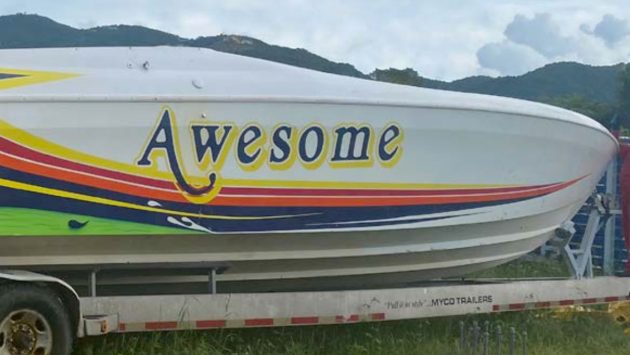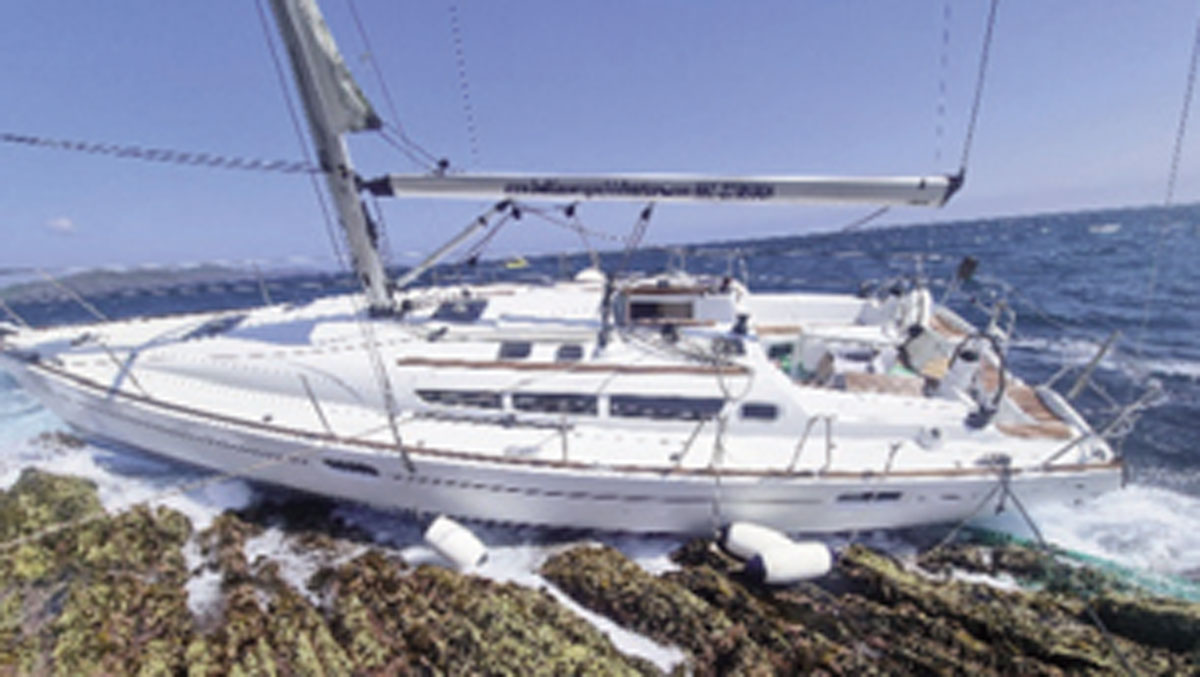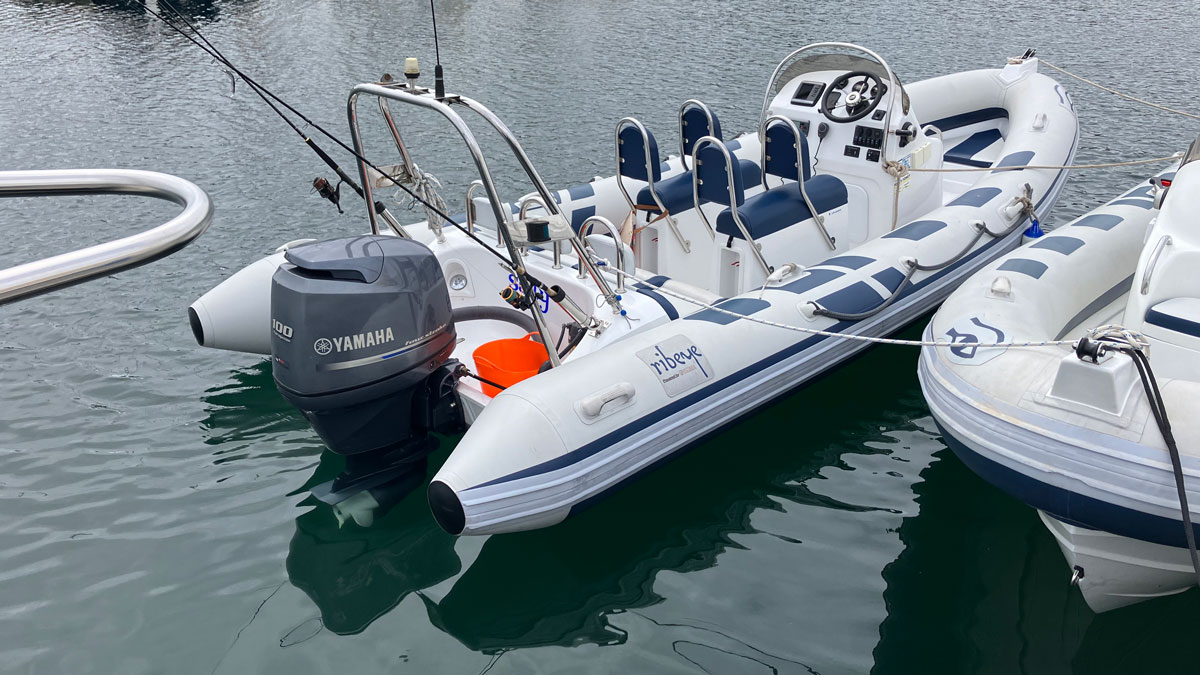An investigation into the deaths of a woman and a child following a powerboat accident has found that killcords and lifejackets were not in use when the boat lost control
A killcord and lifejacket are useless unless worn.
This is the warning from the Marine Accident Investigation Branch (MAIB), following its investigation into a powerboat crash that killed a 32-year-old woman and five-year-old girl on 2 October 2022.
The 37-ft mono-hulled offshore powerboat, Awesome was returning in the evening to its home port at East End Dock on the British Virgin Islands (BVI) when a sudden mechanical failure caused the boat to lose steering control, veer to starboard and then roll violently to port, ejecting ten of the 11 people on board into the water.
The MAIB, which investigated this accident on behalf of the BVI Government, concluded that the powerboat’s single-stepped hull, which is designed to reduce drag, lost its grip on the water when it veered sharply to starboard at high speed, which induced a lateral slide that stopped abruptly as the keel gripped the water, triggering a violent roll.

The approximate track of Awesome before the accident. Credit: Goolge Maps/MAIB
The powerboat was travelling at around 60 miles per hour.
Awesome reared up in the air bow first and landed back in the water on its transom, immediately partially sinking. The air trapped in the forward cabin held the boat briefly afloat vertically, before it sank over the next 5 to 10 minutes.
The mechanical defect was attributed to a failed yoke on the aftmost universal joint on the port drive shaft; the flailing drive shaft had severed a steering system hydraulic hose, resulting in a complete loss of pressure and steering.
The MAIB commissioned an independent expert to inspect the universal joints on the failed port drive shaft, and the intact starboard drive shaft. He concluded that the coupling failure was due to excessive wear caused by a lack of lubrication over a prolonged period.

The failed port shaft universal joint. Credit: MAIB
“Examination of the trunnions, bearings and bearing cups has shown evidence of overloading, overheating and corrosion of the bearings. Small amounts of old grease were found in the bearing housings, but all the bearing caps showed signs of burning and the trunnions showed signs of brinelling (bruising) due to a lack of lubrication. One of the oilways that carries grease to the bearings in the failed drive shaft universal joint was partly blocked with old hard grease,” stated the report by the independent expert.
The expert concluded: “The failure was a sudden event, with no evidence of fatigue. A lack of lubrication caused a trunnion bearing to seize, leading to heavy wear of the trunnion and yoke, this is likely to have occurred over a prolonged period of time. The wear to the yoke reduced its cross-sectional area to a point where it could no longer transmit the level torque applied and suddenly failed. Examination of the remaining trunnions, bearings and bearing cups has shown evidence of overloading, overheating and corrosion of the bearings. It is considered that the failure of the bearings is the most likely cause of the incident.”

The Mercury Racing M6 stern drive units and (inset) universally jointed drive shaft. Credit: MAIB
When the incident happened, Awesome was in convoy with another boat, Shalom. The sea state was calm and there was little wind.
The crew of Shalom, along with local fishermen and the skipper and guests on a charter boat assisted in the search and recovery of Awesome‘s owner and passengers.
Nine people were quickly located and taken ashore to the West End ferry terminal, where they were transferred into the care of the emergency services.
Due to the severity of their injuries, many were taken to a local hospital for treatment.

The damage to Awesome‘s dashboard. Credit: MAIB
Two passengers, Brianna Graham, 5, and Kristal Black, 32, remained unaccounted for and several vessels in the area joined the search for them.
Brianna was found shortly later, unresponsive and lying face down in the water; despite attempts to resuscitate her, the girl was declared dead at the hospital.
The MAIB concluded that she drowned because she was not wearing a PDF or lifejacket which could have kept her head above the water.
Kristal Black was not discovered until several days later when the powerboat was salvaged; her body was found in the forward cabin.
Both Brianna and Kristal sustained “minor head trauma” as a result of the accident and drowned.
No one onboard Awesome was wearing a lifejacket, despite them being available.
The powerboat was fitted with twin supercharged Chevrolet V8 engines and kill switches.

The killcord tied back on the powerboat, Awesome. Credit: MAIB
Each engine had a killcord which would have stopped the boat’s engines; each killcord was found still in place, tied back, indicating neither killcord was in use at the time of the incident.
The engines were mounted side by side in the rear section of the hull and connected to Mercury Racing M6 stern drives via universally jointed drive shafts.
The stern drives were mounted on standoff boxes and fitted with five-bladed, 34-inch pitch3, stainless steel surface-piercing propellers. A tie bar connected the stern drives to ensure they steered in the same direction.
The powerboat had cockpit seating for five people; with insufficient seating for the 11 people onboard, the MAIB concluded the powerboat was “being operated unsafely”.

The kill switches and killcord on Awesome. Credit: MAIB
Brianna was seated in Awesome‘s driving seat, while Kristal was in a rear seat with her child on her knee.
“With Brianna seated in the driver’s seat, the owner had to lean across her to access the engines’ throttles while steering the boat with their right hand. The owner was therefore not in full control of the boat,” concluded the MAIB.
“When travelling at speed, it is good practice to always have one hand on the engine throttles and to steer with the other hand. Not having direct access to the steering and throttles while travelling at around 60 mph was unsafe, especially when not wearing the killcord. It could not be determined whether the owner would have had time to react to the loss of the port drive shaft, but they would have had more opportunity to pull back both engine throttles to lessen the severity of the accident had they been sitting in the driver’s seat.”

Awesome‘s seating arrangement. Credit: MAIB
The MAIB found most of Awesome‘s routine maintenance was completed by the owner, who had no knowledge or awareness that the drive shaft universal joints required regular greasing.
The owner is an experienced leisure boater but doesn’t hold any formal boating qualifications and has not undertaken formal navigation or safety training. The British Virgin Islands (BVI) does not require the owner or operator of a pleasure vessel to hold any formal qualifications to operate their vessel.

Position of Awesome‘s occupants (post-salvage representation). Credit: MAIB
However, all vessels must undergo a pre-registration inspection by an authorised surveyor. The vessel’s owner is required to present evidence of ownership and submit a declaration that the requisite safety equipment is carried on board.
A certificate of registry is issued on successful completion of the application process and the official registration details have to be marked on the vessel.
There was no record of Awesome on the Virgin Islands Shipping Registry (VISR) register nor had an application for the boat’s registration been submitted.
Continues below…
Discarded trawl net to blame for the total loss of a 42ft yacht in southern Ireland
The Marine Casualty Investigation Board (MCIB) report concluded that a discarded trawl net "was the root cause" of the loss…
Fatal Seadogz RIB crash in Southampton Water was “an accident waiting to happen”
The Marine Accident Investigation Branch has concluded that a fatal RIB accident, which killed a teenager, "would likely not have…
RIB driver who sped around 18 knots in inner harbour fined £3,000
This is the first time new high-definition CCTV camera footage has been used by the Falmouth Harbour Authority in a…
Stop the boat! How (and why) I installed an OLAS Guardian wireless killcord
Lightweight, planing motorboats are very susceptible to being blown off course when not under power. This is can be awkward…
Hundreds of pleasure craft operate in BVI waters and the VISR does not have the resources to inspect and register them.
As a result, many BVI pleasure vessels are not registered with the VISR.
The MAIB has issued four safety lessons as a result of the incident.
- Maintenance is important, especially tasks involving the upkeep of less visible drivetrain elements such as greasing drive shaft universal joints; making sure control cables are in good order and not corroded internally; and checking water pumps on outboard motors. Consult the maintenance schedule for each component to preserve functionality and reduce its risk of failure.
- Lifejackets and PFDs are useless unless worn. Correctly fitted PFDs are proven to save lives, and an inflated lifejacket will keep a person afloat with their face up and their head above water even if they are unconscious.
- Safety devices are designed to prevent serious injury and save lives. Many boats are fitted with a killcord, which should be clipped to the driver and will activate a kill switch that stops the engine if they are thrown overboard or away from the driving position.
- Training raises awareness. There are thousands of boaters in the British Virgin Islands, and many more visit annually to enjoy the islands from the water. The training available and provided locally in the BVI will equip captains with the local knowledge required to safely operate their boats and build the confidence and experience of those already familiar with BVI waters.
Get more sailing news with a subscription to Practical Boat Owner

A subscription to Practical Boat Owner magazine costs around 40% less than the cover price.
Print and digital editions are available through Magazines Direct – where you can also find the latest deals.
PBO is packed with information to help you get the most from boat ownership – whether sail or power.
-
-
-
- Take your DIY skills to the next level with trusted advice on boat maintenance and repairs
- Impartial in-depth gear reviews
- Practical cruising tips for making the most of your time afloat
-
-
Follow us on Facebook, Instagram, TikTok and Twitter








